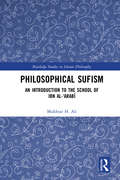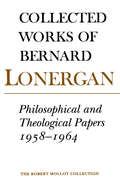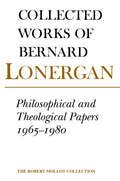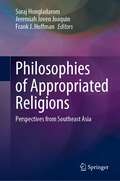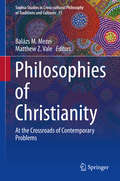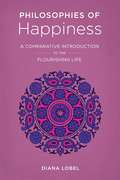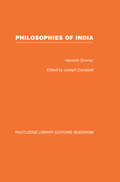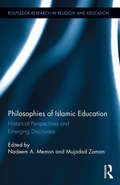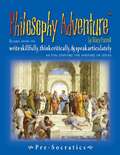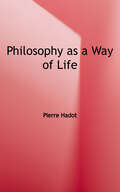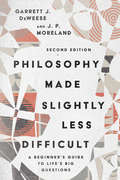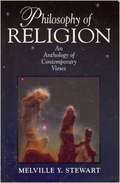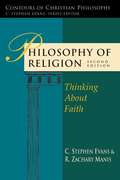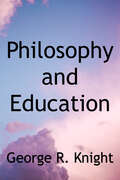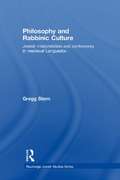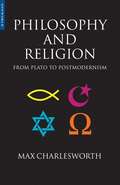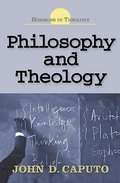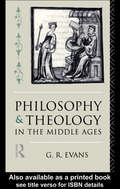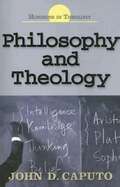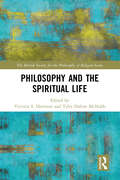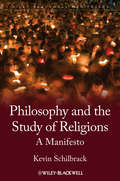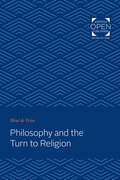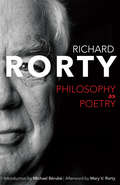- Table View
- List View
Philosophical Religions from Plato to Spinoza
by Carlos FraenkelMany pagan, Jewish, Christian and Muslim philosophers from Antiquity to the Enlightenment made no meaningful distinction between philosophy and religion. Instead they advocated a philosophical religion, arguing that God is Reason and that the historical forms of a religious tradition serve as philosophy's handmaid to promote the life of reason among non-philosophers. Carlos Fraenkel provides the first account of this concept and traces its history back to Plato. He shows how Jews and Christians appropriated it in Antiquity, follows it through the Middle Ages in both Islamic and Jewish forms and argues that it underlies Spinoza's interpretation of Christianity. The main challenge to a philosophical religion comes from the modern view that all human beings are equally able to order their lives rationally and hence need no guidance from religion. Fraenkel's wide-ranging book will appeal to anyone interested in how philosophy has interacted with Jewish, Christian, and Muslim religious traditions.
Philosophical Sufism: An Introduction to the School of Ibn al-'Arabi (Routledge Studies in Islamic Philosophy)
by Mukhtar H. AliAnalyzing the intersection between Sufism and philosophy, this volume is a sweeping examination of the mystical philosophy of Muḥyī-l-Dīn Ibn al-ʿArabī (d. 637/1240), one of the most influential and original thinkers of the Islamic world. This book systematically covers Ibn al-ʿArabī’s ontology, theology, epistemology, teleology, spiritual anthropology and eschatology. While philosophy uses deductive reasoning to discover the fundamental nature of existence and Sufism relies on spiritual experience, it was not until the school of Ibn al-ʿArabī that philosophy and Sufism converged into a single framework by elaborating spiritual doctrines in precise philosophical language. Contextualizing the historical development of Ibn al-ʿArabī’s school, the work draws from the earliest commentators of Ibn al-ʿArabī’s oeuvre, Ṣadr al-Dīn al-Qūnawī (d. 673/1274), ʿAbd al-Razzāq al-Kāshānī (d. ca. 730/1330) and Dawūd al-Qayṣarī (d. 751/1350), but also draws from the medieval heirs of his doctrines Sayyid Ḥaydar Āmulī (d. 787/1385), the pivotal intellectual and mystical figure of Persia who recast philosophical Sufism within the framework of Twelver Shīʿism and ʿAbd al-Raḥmān Jāmī (d. 898/1492), the key figure in the dissemination of Ibn al-ʿArabī’s ideas in the Persianate world as well as the Ottoman Empire, India, China and East Asia via Central Asia. Lucidly written and comprehensive in scope, with careful treatments of the key authors, Philosophical Sufism is a highly accessible introductory text for students and researchers interested in Islam, philosophy, religion and the Middle East.
Philosophical and Theological Papers, 1958-1964: Volume 6
by Bernard Lonergan Robert Doran, S.J. Frederick Crowe, S.J. Robert CrokenThe period during which Bernard Lonergan delivered the eleven lectures in this volume was one of important transition for him: he was moving rapidly toward a new conception of theology and its method; and he was on the verge of what is now recognized as a major breakthrough in his thought on method, the idea that came to him in February 1965 of the eight functional specialities. While the lectures maintain a continuity with Lonergan's previous work, they also reveal new and significant ideas, especially in regard to his drive toward a new conception of theology as a whole, and his particular concern for the relevance of theology to the spiritual life. The lectures here include 'The Redemption,' 'Method in Catholic Theology,' 'The Philosophy of History,' 'The Origins of Christian Realism,' `Time and Meaning,' 'Consciousness and the Trinity,' `Exegesis and Dogma,' 'The Mediation of Christ in Prayer,' 'The Analogy of Meaning,' 'Philosophical Positions with Regard to Knowing,' and 'Theology as Christian Phenomenon.' This volume provides a key to understanding the development of Lonergan's philosophical and theological thought, his major influences, and the pivotal moments of transition in the road leading up to Method in Theology and beyond.
Philosophical and Theological Papers, 1965-1980: Volume 17
by Bernard Lonergan Robert Doran, S.J. Robert CrokenA companion to Philosophical and Theological Papers 1958-1964 (Volume 6 in the Collected Works of Bernard Lonergan series), this anthology contains Lonergan's lectures on philosophy and theology given during the later period of his life, 1965-1980. These papers document his development in the discipline during the years leading up to the publication of Method in Theology, and beyond to 1980 when he was more engaged in his writings and seminars on macroeconomics. Philosophical and Theological Papers 1965-1980 is divided into five sections, forming units on the basis of dates. The three central sections are each a set of lectures respectively given at the Massachusetts Institute of Technology, Gonzaga University in Spokane, and Trinity College (University of Toronto). Although there is some repetition amongst the lecture sets and in relation to other more familiar works, this repetition displays occasional new turns of phrase that the careful reader will note. In at least one instance, familiar material suddenly opens out onto expressions not to be found anywhere else in Lonergan's work. Other very interesting developments regard the movement from speaking of the immutability of dogmas to their permanence of meaning and the permutations among 'real self-transcendence,' 'performative self-transcendence,' and 'moral self-transcendence.'
Philosophies of Appropriated Religions: Perspectives from Southeast Asia
by Soraj Hongladarom Jeremiah Joven Joaquin Frank J. HoffmanThis book brings together different intercultural philosophical points of view discussing the philosophical impact of what we call the ‘appropriated’ religions of Southeast Asia. Southeast Asia is home to most of the world religions. Buddhism is predominantly practiced in Thailand, Vietnam, Myanmar, Singapore, Laos, and Cambodia; Islam in Malaysia, Indonesia, and Brunei; and Christianity in the Philippines and Timor-Leste. Historical data show, however, that these world religions are imported cultural products, and have been reimagined, assimilated, and appropriated by the culture that embraced them. In this collection, we see that these ‘appropriated’ religions imply a culturally nuanced worldview, which, in turn, impacts how the traditional problems in the philosophy of religion are framed and answered—in particular, questions about the existence and nature of the divine, the problem of evil, and the nature of life after death. Themes explored include: religious belief and digital transition, Theravāda Buddhist philosophy, religious diversity, Buddhism and omniscience, indigenous belief systems, divine apology and unmerited human suffering, dialetheism and the problem of evil, Buddhist philosophy and Spinoza’s views on death and immortality, belief and everyday realities in the Philippines, comparative religious philosophy, gendering the Hindu concept of dharma, Christian devotion and salvation during the Spanish colonial period in the Philippines through the writings of Jose Rizal, indigenous Islamic practices in the Philippines, practiced traditions in contemporary Filipino celebrations of Christmas, role of place-aspects in the appropriation of religions in Southeast Asia, and fate and divine omniscience. This book is of interest to scholars and researchers of philosophy of religion, sociology of religion, anthropology of religion, cultural studies, comparative religion, religious studies, and Asian studies.
Philosophies of Christianity: At the Crossroads of Contemporary Problems (Sophia Studies in Cross-cultural Philosophy of Traditions and Cultures #31)
by Balázs M. Mezei Matthew Z. ValeThis book examines key issues in Christianity from various philosophical points of view. It brings together European authors with American theologians and philosophers on an interconfessional basis. Coverage combines analytical and continental approaches in a unique way. This comprehensive, innovative analysis will help readers gain a deep understanding into a wide range of philosophical approaches to basic Christian problems. The novelty of this volume is the unique combination of philosophical and theological approaches. It merges these points-of-view in a rational manner which characterizes segments of Anglo-American and Continental thought. The scope of the work covers historical issues, contemporary problems of atheism, and also novel approaches to fundamental notions. Readers will learn about questions surrounding the French New Theology, Zizek’s philosophical sources, the notion of revelation, and much more. As a work produced by European and United States scholars, this volume is an important contribution not only to the dialogue between various academic cultures, but also to the expression of their fruitful cooperation which grounds and inspires serious academic research. The readership of this work begins at an undergraduate level and reaches up to academic researchers and professors interested in borderline problems between philosophy and theology, history and contemporary issues.
Philosophies of Happiness: A Comparative Introduction to the Flourishing Life
by Diana LobelWhat does it mean to be truly happy? In Philosophies of Happiness, Diana Lobel provides a rich spectrum of arguments for a theory of happiness as flourishing or well-being, offering a global, cross-cultural, and interdisciplinary perspective on how to create a vital, fulfilling, and significant life. Drawing upon perspectives from a broad range of philosophical traditions—Eastern and Western, ancient and contemporary—the book suggests that just as physical health is the well-being of the body, happiness is the healthy and flourishing condition of the whole human being, and we experience the most complete happiness when we realize our potential through creative engagement.Lobel shows that while thick descriptions of happiness differ widely in texture and detail, certain themes resonate across texts from different traditions and historical contexts, suggesting core features of a happy life: attentive awareness; effortless action; relationship and connection to a larger, interconnected community; love or devotion; and creative engagement. Each feature adds meaning, significance, and value, so that we can craft lives of worth and purpose. These themes emerge from careful study of philosophical and religious texts and traditions: the Greek philosophers Aristotle and Epicurus; the Chinese traditions of Confucius, Laozi, and Zhuangzi; the Hindu Bhagavad Gītā; the Japanese Buddhist tradition of Soto Zen master Dōgen and his modern expositor Shunryu Suzuki; the Western religious traditions of Augustine and Maimonides; the Persian Sufi tale Conference of the Birds; and contemporary research on mindfulness and creativity. Written in a clear, accessible style, Philosophies of Happiness invites readers of all backgrounds to explore and engage with religious and philosophical conceptions of what makes life meaningful.Visit https://cup.columbia.edu/extras/supplement/philosophies-of-happiness for additional appendixes and supplemental notes.
Philosophies of India (Routledge Library Editions: Buddhism #9)
by Heinrich ZimmerOriginally published in 1973. The volume is divided into four sections: The introduction places the position of the Buddhist Tantras within Mahayana Buddhism and recalls their early literary history, especially the Guhyasamahatantra; the section also covers Buddhist Genesis and the Tantric tradition. The foundations of the Buddhist Tantras are discussed and the Tantric presentation of divinity; the preparation of disciples and the meaning of initiation; symbolism of the mandala-palace Tantric ritual and the twilight language. This section explores the Tantric teachings of the inner Zodiac and the fivefold ritual symbolism of passion. The bibliographical research contains an analysis of the Tantric section of the Kanjur exegesis and a selected Western Bibliography of the Buddhist Tantras with comments.
Philosophies of Islamic Education: Historical Perspectives and Emerging Discourses (Routledge Research in Religion and Education #4)
by Mujadad Zaman Nadeem A. MemonThe study of Islamic education has hitherto remained a tangential inquiry in the broader focus of Islamic Studies. In the wake of this neglect, a renaissance of sorts has occurred in recent years, reconfiguring the importance of Islam’s attitudes to knowledge, learning and education as paramount in the study and appreciation of Islamic civilization. Philosophies of Islamic Education, stands in tandem to this call and takes a pioneering step in establishing the importance of its study for the educationalist, academic and student alike. Broken into four sections, it deals with theological, pedagogic, institutional and contemporary issues reflecting the diverse and often competing notions and practices of Islamic education. As a unique international collaboration bringing into conversation theologians, historians, philosophers, teachers and sociologists of education Philosophies of Islamic Education intends to provide fresh means for conversing with contemporary debates in ethics, secularization theory, child psychology, multiculturalism, interfaith dialogue and moral education. In doing so, it hopes to offer an important and timely contribution to educational studies as well as give new insight for academia in terms of conceiving learning and education.
Philosophy Adventure: Pre-Socratics
by Stacy FarrellPhilosophy AdventureTM is a program designed to help students 6th-12th grade cultivate and defend a biblical worldview by teaching them how to write skillfully, think critically, and speak articulately as they explore the history of philosophy. Engaging Easy to use Empowering!
Philosophy As a Way of Life: Spiritual Exercises from Socrates to Foucault
by Pierre HadotThis book presents a history of spiritual exercises from Socrates to early Christianity, an account of their decline in modern philosophy, and a discussion of the different conceptions of philosophy that have accompanied the trajectory and fate of the theory and practice of spiritual exercises. Hadot's book demonstrates the extent to which philosophy has been, and still is, above all else a way of seeing and of being in the world.
Philosophy Made Slightly Less Difficult: A Beginner's Guide to Life's Big Questions
by J. P. Moreland Garrett J. DeWeeseWhat is real?How do we know what we know?What is the right thing to do?What does it mean to be human?How should we view science and its claims?Why should we believe that God exists?
Philosophy Of Judaism
by Joshua AdlerA survey of the sociological and cultural aspects of Judaism in society today.
Philosophy Of Religion: An Anthology Of Contemporary Views (Philosophy)
by Melville Y. StewartThis volume contains primarily recent essays in philosophy of religion, representing the analytic and continental traditions of the West. A total of 36 authors from varying Christian traditions, and several from the atheistic orientation have contributed to a total of 42 essays. Nearly half of the essays are unique to this anthology.
Philosophy Of Religion: Thinking About Faith
by C. Stephen Evans R. Zachary ManisWith over 40,000 copies in print since its original publication in 1982, Steve Evans's Philosophy of Religion has served many generations of students as a classic introduction to the philosophy of religion from a Christian perspective. Over the years the philosophical landscape has changed, and in this new edition Zach Manis joins Evans in a thorough revamping of arguments and information, while maintaining the qualities of clarity and brevity that made the first edition so appreciated. New material on divine foreknowledge and human freedom has been added as well as on Reformed epistemology. The discussions on science now cover new developments from cognitive psychology and naturalism as well as on the fine-tuning of the cosmos. The chapter on faith and reason has been expanded to include consideration of evidentialism. The problem of evil now forms its own new chapter and adds a discussion of the problem of hell. The standard features remain: a survey of the field, an examination of classical arguments for God's existence, and an exploration of contemporary challenges to theism from the social sciences and philosophy as well as the natural sciences. The meaning and significance of personal religious experience, revelation and miracles--all within the realm of contemporary religious pluralism--are likewise investigated. A classic introduction thoroughly updated and refreshed for today's student.
Philosophy and Education: An Introduction in Christian Perspective
by George R. KnightThis book has been a classic in its field for more than a quarter of a century. New features of this revised and updated fourth edition make it of even greater usefulness in the educational philosophy classrooms of a new century. These include an all-new chapter on the Christian teacher in the public school setting; "Points to Ponder" study questions at the end of each chapter; new material addressing the latest relevant issues, including the rise of the home school movement, and the relation of the Intelligent Design debate to Christian educational philosophy; a fresh, new text design, including call-out highlights of major themes; and an updated bibliography and references.
Philosophy and Rabbinic Culture: Jewish Interpretation and Controversy in Medieval Languedoc (Routledge Jewish Studies Series)
by Gregg SternPhilosophy and Rabbinic Culture is a study of the great, and curiously underappreciated, engagement of a Medieval European Jewish community with the philosophic tradition. This lucid description of the Languedocian Jewish community's multigenerational cultivation of - and acculturation to - scientific and philosophic teachings into Judaism fulfils a major desideratum in Jewish cultural history. In the first detailed account of this long-forgotten Jewish community and its cultural ideal, the author gives an expansive reappraisal of the role of the philosophic interpretation in rabbinic culture and medieval Judaism. Looking at how the cultural ideal of Languedocian Jewry continued to develop and flourish throughout the thirteenth and fourteenth centuries, with particular reference to the literary style and religious teaching of the great Talmudist, Menahem ha-Meiri, Stern explores issues such as Meiri’s theory of "civilized religions", including Christianity and Islam, controversy over philosophy and philosophic allegory in Languedoc and Catalonia, and the cultural significance of the medical use of astrological images. This book will be of great interest to scholars and students of Religion, of Judaism in particular, and of Philosophy, History and Medieval Europe, as well as those interested in Jewish-Christian relations.
Philosophy and Religion from Plato to Postmodernism: From Plato to Postmodernism
by Max CharlesworthFrom the works of the Greek philosophers to the Postmodernist theories of Jacques Derrida and Richard Rorty, this authoritative survey encompasses over two thousand years of interaction between philosophical and religious though.<P><P>Exploring the various ways in which philosophy can relate to the monotheistic religions, the author tracks five key approaches in a carefully structured and accessible manner. Following a chronological pattern, these five chapters consider both major and less well-known philosophers, and feature detailed coverage of:Plato, Aristotle and the Ancient GreeksPhilosophy and theology in St Augustine and Thomas Aquinasreason, agnosticism and the works of Kant and KierkegaardLinguistic Analysis, religion and WittgensteinPostmodernism and religion: Heidegger, Derrida and RortyAccompanied by full reference notes, this thorough and up to date text is essential reading for all students and thinkers who wish to know more about philosophy,religion and the diverse ways in which these two fields have come together over the centures.
Philosophy and Theology
by John D. CaputoA highly engaging essay that will draw students into a conversation about the vital relationship between philosophy and theology. John D. Caputo addresses the great and classical philosophical questions as they inextricably intersect with theology.
Philosophy and Theology in the Middle Ages
by G. R. EvansIn the ancient world being a philosopher was a practical alternative to being a christian. Philosophical systems offered intellectual, practical and moral codes for living. By the Middle Ages however philosophy was largely, though inconsistently, incorporated into Christian belef. From the end of the Roman Empire to the Reformation and Renaissance of the sixteenth century Christian theologians had a virtual monopoly on higher education. The complex interaction between theology and philosophy, which was the result of the efforts of Christian leaders and thinkers to assimilate the most sophisticated ideas of science and secular learning into their own system of thought, is the subject of this book. Augustine, as the most widely read author in the Middle Ages, is the starting point. Dr Evans then discusses the classical sources in general which the medieval scholar would have had access to when he wanted to study philosophy and its theological implications. Part I ends with an analysis of the problems of logic, language and rhetoric. In Part II the sequence of topics - God, cosmos, man follow the outline of the summa, or systematic encyclopedia of theology, which developed from the twelfth century as a text book framework. Does God exist? What is he like? What are human beings? Is there a purpose to their lives? These are the great questions of philosophy and religion and the issues to which the medieval theologian addressed himself. From `divine simplicity' to ethics and politics, this book is a lively introduction to the debates and ideas of the Middle Ages.
Philosophy and Theology: A Theology Of Difficult Glory (Horizons in Theology)
by John CaputoA highly engaging essay that will draw students into a conversation about the vital relationship between philosophy and theology.In this clear, concise, and brilliantly engaging essay, renowned philosopher and theologian John D. Caputo addresses the great and classical philosophical questions as they inextricably intersect with theology--past, present, and future. Recognized as one of the leading philosophers, Caputo is peerless in introducing and initiating students into the vital relationship that philosophy and theology share together. He writes, “If you take a long enough look, beyond the debates that divide philosophy and theology, over the walls that they have built to keep each other out or beyond the wars to subordinate one to the other, you find a common sense of awe, a common gasp of surprise or astonishment, like looking out at the endless sprawl of stars across the evening sky or upon the waves of a midnight sea.”
Philosophy and the Spiritual Life (The British Society for the Philosophy of Religion Series)
by Victoria S. Harrison Tyler Dalton McNabbThis book breaks new ground for the philosophy of religion by showcasing work that engages with the lived reality of the spiritual life. It demonstrates that philosophy’s relationship with spirituality is more than a historical curiosity and that, in the twenty-first century, it is still meaningful to think about philosophy in connection with spirituality. The chapters are organised around the following themes: spiritual practice and philosophical understanding; philosophical reflections on living a spiritual life; philosophical problems concerning the spiritual life. The first part discusses whether or not the topic of spirituality should be given a more fundamental role within the philosophy of religion, and, if so, how that might be accomplished. The second part addresses fundamental issues concerning human beings, their lives, and their self-understanding in relation to the spiritual life. The final part considers philosophical problems that emerge when discussing the spiritual life. By bringing together discussions of these topics, this volume constitutes a valuable resource for scholars in disciplines in which the spiritual life is a focus of interest, particularly philosophy, theology, and religious studies.
Philosophy and the Study of Religions: A Manifesto (Wiley-Blackwell Manifestos)
by Kevin SchilbrackPhilosophy and the Study of Religions: A Manifesto advocates a radical transformation of the discipline from its current, narrow focus on questions of God, to a fully global form of critical reflection on religions in all their variety and dimensions. Opens the discipline of philosophy of religion to the religious diversity that characterizes the world today Builds bridges between philosophy of religion and the other interpretative and explanatory approaches in the field of religious studies Provides a manifesto for a global approach to the subject that is a practice-centred rather than a belief-centred activity Gives attention to reflexive critical studies of 'religion' as socially constructed and historically located
Philosophy and the Turn to Religion
by Hent de VriesOriginally published in 1999. If religion once seemed to have played out its role in the intellectual and political history of Western secular modernity, it has now returned with a vengeance. In Philosophy and the Turn to Religion, Hent de Vries argues that a turn to religion discernible in recent philosophy anticipates and accompanies this development in the contemporary world. Though the book reaches back to Immanuel Kant, Martin Heidegger, and earlier, it takes its inspiration from the tradition of French phenomenology, notably Emmanuel Levinas, Jean-Luc Marion, and, especially, Jacques Derrida. Tracing how Derrida probes the discourse on religion, its metaphysical presuppositions, and its transformations, de Vries shows how this author consistently foregrounds the unexpected alliances between a radical interrogation of the history of Western philosophy and the religious inheritance from which that philosophy has increasingly sought to set itself apart.De Vries goes beyond formal analogies between the textual practices of deconstruction and so-called negative theology to address the necessity for a philosophical thinking that situates itself at once close to and at the farthest remove from traditional manifestations of the religious and the theological. This paradox is captured in the phrase adieu (à dieu), borrowed from Levinas, which signals at once a turn toward and a leave-taking from God—and which also gestures toward and departs from the other of this divine other, the possibility of radical evil. Only by confronting such uncanny and difficult figures, de Vries claims, can one begin to think and act upon the ethical and political imperatives of our day.
Philosophy as Poetry (Page-Barbour Lectures)
by Richard Rorty Michael Bérubé Mary Varney RortyUndeniably iconoclastic, and doggedly practical where others were abstract, the late Richard Rorty was described by some as a philosopher with no philosophy. Rorty was skeptical of systems claiming to have answers, seeing scientific and aesthetic schools as vocabularies rather than as indispensable paths to truth. But his work displays a profound awareness of philosophical tradition and an urgent concern for how we create a society. As Michael Bérubé writes in his introduction to this new volume, Rorty looked upon philosophy as "a creative enterprise of dreaming up new and more humane ways to live." Drawn from Rorty's acclaimed 2004 Page-Barbour lectures, Philosophy as Poetry distills many of the central ideas in his work. Rorty begins by addressing poetry and philosophy, which are often seen as contradictory pursuits. He offers a view of philosophy as a poem, beginning with the ancient Greeks and rewritten by succeeding generations of philosophers seeking to improve it. He goes on to examine analytic philosophy and the rejection by some philosophers, notably Wittgenstein, of the notion of philosophical problems that have solutions. The book concludes with an invigorating suspension of intellectual borders as Rorty focuses on the romantic tradition and relates it to philosophic thought.This book makes an ideal starting place for anyone looking for an introduction to Rorty's thought and his contribution to our sense of an American pragmatism, as well as an understanding of his influence and the controversy that attended his work.Page-Barbour Lectures

